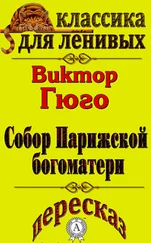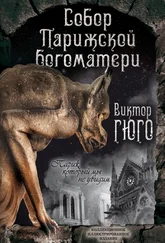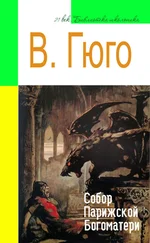| "In that case Our Lady knows that I am greatly in need of money, and I should much desire to read in your books. Tell me, reverend master, is your science inimical or displeasing to Our Lady?" |
- В таком случае, пресвятой деве известно, как я нуждаюсь в деньгах, - я очень хотел бы научиться читать по вашим книгам Скажите, уважаемый учитель, ваша наука не враждебна и не противна божьей матери? |
| "Whose archdeacon I am?" Dom Claude contented himself with replying, with tranquil hauteur. |
В ответ на этот вопрос Клод с высокомерным спокойствием промолвил: - А кому же я служу как архидьякон? |
| "That is true, my master. Well! will it please you to initiate me? |
- Ваша правда А вы удостоите посвятить меня в тайны вашей науки? |
| Let me spell with you." |
Позвольте мне вместе с вами учиться читать. |
| Claude assumed the majestic and pontifical attitude of a Samuel. |
Клод принял величественную позу первосвященника Самуила: |
| "Old man, it requires longer years than remain to you, to undertake this voyage across mysterious things. |
- Старик! Чтобы предпринять путешествие сквозь эти таинственные дебри, нужны долгие годы, которых у вас уже нет впереди. |
| Your head is very gray! |
Ваши волосы серебрит седина. |
| One comes forth from the cavern only with white hair, but only those with dark hair enter it. |
Но с седой головой выходят из этой пещеры, а вступают в нее тогда, когда волос еще темен. |
| Science alone knows well how to hollow, wither, and dry up human faces; she needs not to have old age bring her faces already furrowed. |
Наука и сама умеет избороздить, обесцветить и иссушить человеческий лик. Зачем ей старость с ее морщинами? |
| Nevertheless, if the desire possesses you of putting yourself under discipline at your age, and of deciphering the formidable alphabet of the sages, come to me; 'tis well, I will make the effort. |
Но если вас, в ваши годы, все еще обуревает желание засесть за науку и разбирать опасную азбуку мудрых, придите, пусть будет так, я попытаюсь. |
| I will not tell you, poor old man, to go and visit the sepulchral chambers of the pyramids, of which ancient Herodotus speaks, nor the brick tower of Babylon, nor the immense white marble sanctuary of the Indian temple of Eklinga. |
Я не пошлю вас, слабого старика, изучать усыпальницы пирамид, о которых свидетельствует древний Г еродот, или кирпичную Вавилонскую башню, или исполинское, белого мрамора святилище индийского храма в Эклинге. |
| I, no more than yourself, have seen the Chaldean masonry works constructed according to the sacred form of the Sikra, nor the temple of Solomon, which is destroyed, nor the stone doors of the sepulchre of the kings of Israel, which are broken. |
Я и сам не видел ни халдейских каменных сооружений, воспроизводящих священную форму Сикры, ни разрушенного храма Соломона, ни сломанных каменных врат гробницы царей израильских. |
| We will content ourselves with the fragments of the book of Hermes which we have here. |
Мы с вами удовольствуемся отрывками из имеющейся у нас книги Гермеса. |
| I will explain to you the statue of Saint Christopher, the symbol of the sower, and that of the two angels which are on the front of the Sainte-Chapelle, and one of which holds in his hands a vase, the other, a cloud-" |
Я объясню вам смысл статуи святого Христофора, символ сеятеля и символ двух ангелов, изображенных у портала Сент-Шапель, из которых один погрузил свою длань в сосуд, а другой скрыл свою в облаке... |
| Here Jacques Coictier, who had been unhorsed by the archdeacon's impetuous replies, regained his saddle, and interrupted him with the triumphant tone of one learned man correcting another,-"Erras amice Claudi. |
Но тут Жак Куактье, смущенный пылкой речью архидьякона, оправился и прервал его торжествующим тоном ученого, исправляющего ошибку собрата: - Err as, amice Claudi! |
| The symbol is not the number. |
Символ не есть число. |
| You take Orpheus for Hermes." |
Вы принимаете Орфея за Гермеса. |
| "'Tis you who are in error," replied the archdeacon, gravely. |
- Это вы заблуждаетесь, - внушительным тоном ответил архидьякон. |
| "Daedalus is the base; Orpheus is the wall; Hermes is the edifice,-that is all. |
Дедал - это цоколь; Орфей - это стены; Гермес -это здание в целом. |
| You shall come when you will," he continued, turning to Tourangeau, "I will show you the little parcels of gold which remained at the bottom of Nicholas Flamel's alembic, and you shall compare them with the gold of Guillaume de Paris. |
Вы придете, когда вам будет угодно, - продолжал он, обращаясь к Туранжо, я покажу вам крупинки золота, осевшего на дне тигля Никола Фламеля, и вы сравните их с золотом Гильома Парижского. |
| I will teach you the secret virtues of the Greek word, peristera. But, first of all, I will make you read, one after the other, the marble letters of the alphabet, the granite pages of the book. |
Я объясню вам тайные свойства греческого слова peristera, но прежде всего я научу вас разбирать одну за другой мраморные буквы алфавита, гранитные страницы великой книги. |
| We shall go to the portal of Bishop Guillaume and of Saint-Jean le Rond at the Sainte-Chapelle, then to the house of Nicholas Flamel, Rue Manvault, to his tomb, which is at the Saints-Innocents, to his two hospitals, Rue de Montmorency. |
От портала епископа Гильома и Сен-Жан ле Рон мы отправимся к Сент-Шапель, затем к домику Никола Фламеля на улице Мариво, к его могиле на кладбище Невинных, к двум его больницам на улице Монморанси. |
| I will make you read the hieroglyphics which cover the four great iron cramps on the portal of the hospital Saint-Gervais, and of the Rue de la Ferronnerie. |
Я научу вас разбирать иероглифы, которыми покрыты четыре массивные железные решетки портала больницы Сен-Жерве и на Скобяной улице. |
| We will spell out in company, also, the fa?ade of Saint-Come, of Sainte-Genevi?ve-des-Ardents, of Saint Martin, of Saint-Jacques de la Boucherie-." |
Мм вместе постараемся разобраться в том, о чем говорят фасады церквей Сен-Ком, Сент-Женевьев-дез-Ардан, Сен-Мартен, Сен-Жак-де-ла-Бушри... |
| For a long time, Gossip Tourangeau, intelligent as was his glance, had appeared not to understand Dom Claude. |
Уже давно, несмотря на весь свой ум, светившийся у него в глазах, кум Туранжо перестал понимать отца Клода. |
| He interrupted. |
Наконец он перебил его: |
| "Pasque-dieu! what are your books, then?" |
- С нами крестная сила! Что же это за книга? |
| "Here is one of them," said the archdeacon. |
- А вот одна из них, - ответил архидьякон. |
| And opening the window of his cell he pointed out with his finger the immense church of Notre-Dame, which, outlining against the starry sky the black silhouette of its two towers, its stone flanks, its monstrous haunches, seemed an enormous two-headed sphinx, seated in the middle of the city. |
Распахнув окно своей кельи, он указал на громаду Собора Богоматери. Выступавший на звездном небе черный силуэт его башен, каменных боков, всего чудовищного корпуса казался исполинским двуглавым сфинксом, который уселся посреди города. |
| The archdeacon gazed at the gigantic edifice for some time in silence, then extending his right hand, with a sigh, towards the printed book which lay open on the table, and his left towards Notre-Dame, and turning a sad glance from the book to the church,-"Alas," he said, "this will kill that." |
Некоторое время архидьякон молча созерцал огромное здание, затем со вздохом простер правую руку к лежавшей на столе раскрытой печатной книге, а левую - к Собору Богоматери и, переведя печальный взгляд с книги на собор, произнес: -Увы! Вот это убьет то. |

![Виктор Гюго - Собор Парижской Богоматери [Notre-Dame de Paris]](/books/30985/viktor-gyugo-sobor-parizhskoj-bogomateri-notre-thumb.webp)
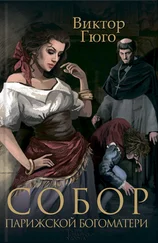
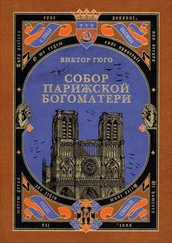
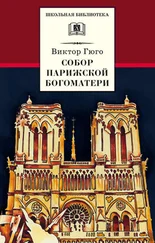
![Виктор Гюго - Собор Парижской Богоматери. Париж [сборник]](/books/398980/viktor-gyugo-sobor-parizhskoj-bogomateri-parizh-sbo-thumb.webp)
